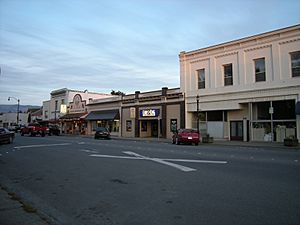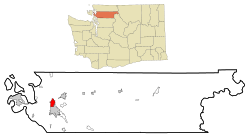Burlington, Washington facts for kids
Quick facts for kids
Burlington, Washington
|
|
|---|---|

Fairhaven Avenue in downtown Burlington
|
|
| Nickname(s):
The Hub City
|
|

Location of Burlington in Washington
|
|
| Country | United States |
| State | Washington |
| County | Skagit |
| Incorporated | June 16, 1902 |
| Government | |
| • Type | Mayor–council |
| Area | |
| • Total | 4.44 sq mi (11.49 km2) |
| • Land | 4.28 sq mi (11.08 km2) |
| • Water | 0.16 sq mi (0.41 km2) 3.62% |
| Elevation | 30 ft (9.1 m) |
| Population
(2020)
|
|
| • Total | 9,152 |
| • Estimate
(2021)
|
9,224 |
| • Density | 2,137.8/sq mi (825.4/km2) |
| Time zone | UTC-8 (PST) |
| • Summer (DST) | UTC-7 (PDT) |
| ZIP code |
98233
|
| Area code | 360 |
| FIPS code | 53-08920 |
| GNIS feature ID | 1512052 |
Burlington is a city in Skagit County, Washington, United States. In 2020, about 9,152 people lived there. Burlington is located almost exactly halfway between the big city of Seattle and Vancouver, Canada. It's part of the wider Mount Vernon and Anacortes, Washington area.
Contents
History of Burlington
Burlington started as a place for logging in 1882. Two people, John P. Millett and William McKay, set it up. The city officially became a city on June 16, 1902.
In the beginning, most of Burlington's shops and businesses were on Fairhaven Avenue. Today, this street is still the heart of Burlington's old downtown, which has been updated and made lively again.
In 2007, the city opened a brand new library and a new city hall building.
Geography of Burlington
Burlington covers about 4.42 square miles (11.45 square kilometers). Most of this area is land, with a small part being water. The highest spot in the city is Burlington Hill. This hill rises about 450 feet (137 meters) above sea level, just north of the downtown area.
Burlington Hill Cross
In the 1940s, the city's fire department placed a Christian cross on top of Burlington Hill. They used to light it up for holidays. In 1965, a bigger cross was put there, and it stays lit all the time. It was updated in 2016.
Flooding in Burlington
The Skagit River has often flooded in the past. This has affected Burlington and other towns in the Skagit Valley. For example, a newspaper in 1909 wrote about a dike breaking. This caused a lot of water to rush down the valley and flood Burlington quickly.
To protect the city, there is a system of dikes. These dikes are managed by Skagit County Dike District #12, which started in 1895.
People of Burlington
| Historical population | |||
|---|---|---|---|
| Census | Pop. | %± | |
| 1910 | 1,302 | — | |
| 1920 | 1,360 | 4.5% | |
| 1930 | 1,407 | 3.5% | |
| 1940 | 1,632 | 16.0% | |
| 1950 | 2,350 | 44.0% | |
| 1960 | 2,968 | 26.3% | |
| 1970 | 3,138 | 5.7% | |
| 1980 | 3,894 | 24.1% | |
| 1990 | 4,349 | 11.7% | |
| 2000 | 6,757 | 55.4% | |
| 2010 | 8,388 | 24.1% | |
| 2020 | 9,152 | 9.1% | |
| 2021 (est.) | 9,702 | 15.7% | |
| U.S. Decennial Census 2018 Estimate |
|||
In 2010, there were 8,388 people living in Burlington. These people lived in 3,166 homes. About 37% of these homes had children under 18 living there.
The average age of people in Burlington was about 32 years old. About 27% of residents were under 18. About 13% were 65 years old or older. The population was almost evenly split between males (48.5%) and females (51.5%).
Economy of Burlington
Burlington was once home to Cascade Mall, a large shopping center. It was located in the middle of the Skagit Valley. The mall was a single-level building with a lot of shops.
Cascade Mall opened in 1989. At that time, The Wall Street Journal newspaper said Burlington was one of the fastest-growing small towns in the U.S. The mall was easy to reach, being close to Interstate 5 and State Route 20. The mall closed permanently on June 30, 2020, because of the COVID-19 pandemic. However, some stores around the outside of the mall stayed open.
Events in Burlington
The city hosts a fun festival every June called "Berry Dairy Days." This event celebrates Burlington's history in farming, especially with berries and dairy. The festival started in 1937 as the Strawberry Festival. It was originally a way to raise money for the town's fire department.
Today, Berry Dairy Days features many exciting things. You can enjoy performances, play games at carnival booths, and try delicious fair food. The main event of Berry Dairy Days is a big parade that goes down Fairhaven Avenue in downtown Burlington.
Famous People from Burlington
- Lynn D. "Buck" Compton: A soldier who was part of the famous Easy Company (shown in the TV series Band of Brothers). He was also a police officer and a lawyer.
- Mel Hein: An American football player and coach. He is in the Pro Football Hall of Fame.
- Mary Mapes: A journalist and TV producer who worked for 60 Minutes.
- Fred Schacht: A medical doctor and an American football player and coach.
- Charles F. Stafford: A lawyer who became a Justice on the Washington Supreme Court.
See also
 In Spanish: Burlington (Washington) para niños
In Spanish: Burlington (Washington) para niños

